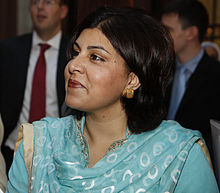- Chairman of the Conservative Party
-
In the United Kingdom, the Chairman of the Conservative Party is responsible for running the party machine, overseeing Conservative Central Office. When the Conservatives are in power, the Chairman is usually a member of the Cabinet being given a sinecure position such as Minister without Portfolio. Deputy or vice-chairmen may also be appointed, with responsibility for specific aspects of the Conservative Party (for example, local government, women or youth).
Contents
List
- Arthur Steel-Maitland (1911–1916)
- Sir George Younger (1916–1923)
- Stanley Jackson (1923–1926)
- John Davidson (1926–1930)
- Neville Chamberlain (1930–1931)
- Lord Stonehaven (1931–1936)
- Sir Douglas Hacking (1936–1942)
- Thomas Dugdale (1942–1944)
- Ralph Assheton (1944–1946)
- Lord Woolton (1946–1955)
- Oliver Poole (1955–1957)
- Quintin McGarel Hogg, 2nd Viscount Hailsham (1957-1959)
- Rab Butler (1959–1961)
- Iain Macleod (1961–1963)
- Lord Poole (1963, joint chairman)
- Lord Blakenham (1963–1965)
- Edward du Cann (1965–1967)
- Anthony Barber (1967–1970)
- Peter Thomas (1970–1972)
- Lord Carrington (1972–1974)
- William Whitelaw (1974–1975)
- Peter Thorneycroft (1975–1981)
- Cecil Parkinson (1981–1983)
- John Gummer (1983–1985)
- Norman Tebbit (1985–1987)
- Peter Brooke (1987–1989)
- Kenneth Baker (1989–1990)
- Chris Patten (1990–1992)
- Sir Norman Fowler (1992-1994)
- Jeremy Hanley (1994–1995)
- Brian Mawhinney (1995–1997)
- Cecil Parkinson (1997–1998)
- Michael Ancram (1998–2001)
- David Davis (2001–2002)
- Theresa May (2002–2003)
- Liam Fox and Maurice Saatchi (2003–2005)
- Francis Maude (2005–2007)
- Caroline Spelman (2007–2009)
- Eric Pickles (2009–2010)
- Lady Warsi and Lord Feldman of Elstree (2010–) - both as Co-Chairs of the Conservative Party
See also
- 1922 Committee - the parliamentary body of the Conservative Party, which has its own Chairman
Sources
External links
Categories:
Wikimedia Foundation. 2010.

